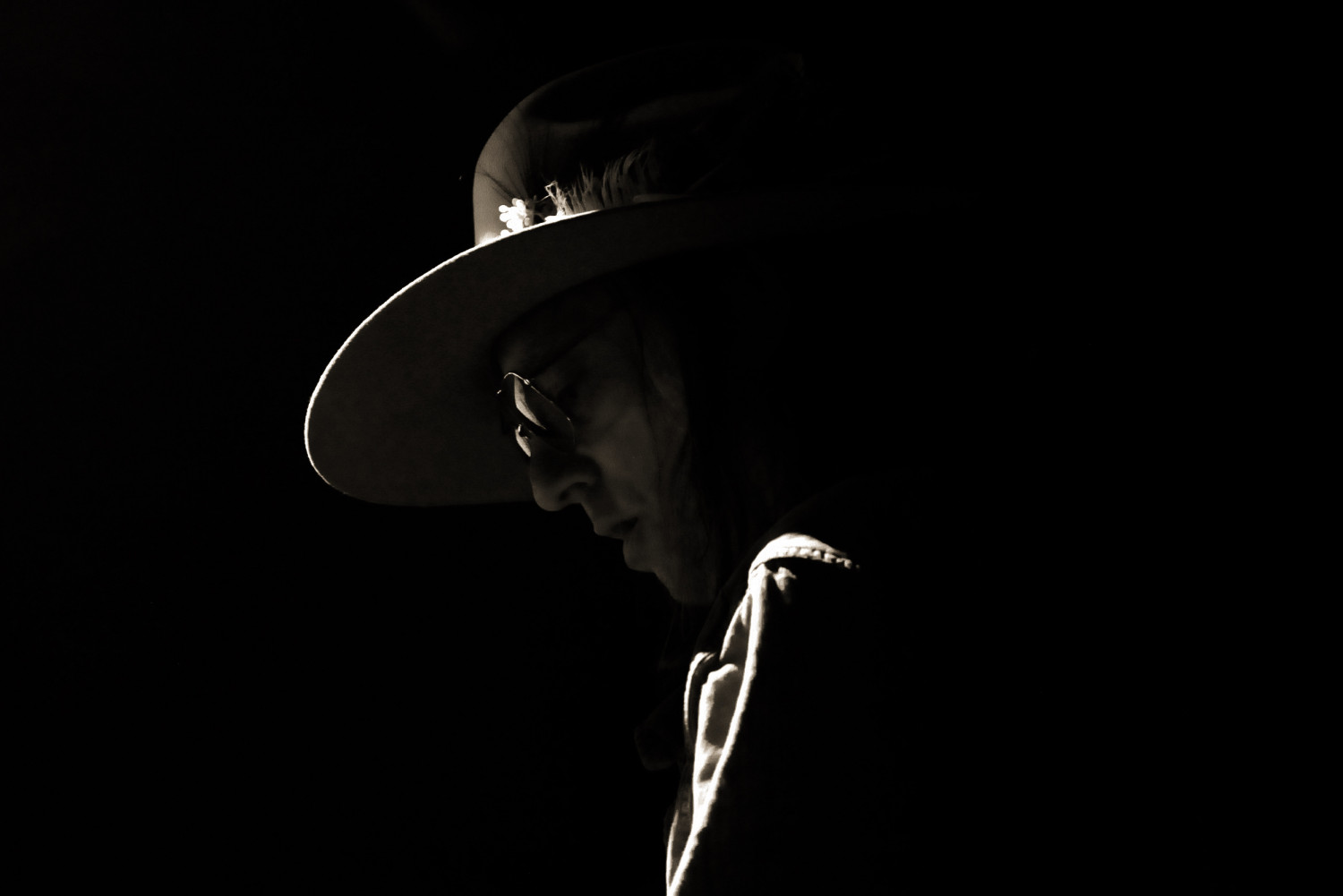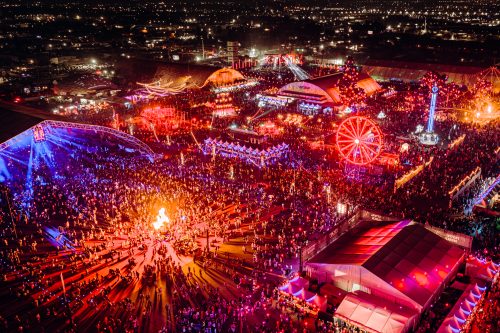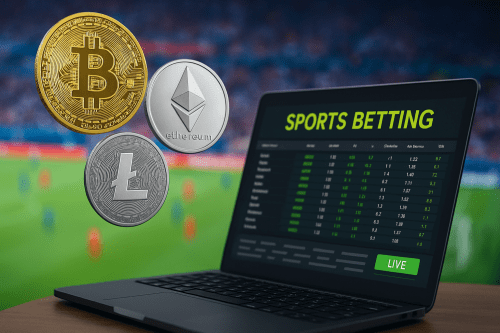In an exclusive interview with Respect My Region, Anton Newcombe from the Brian Jonestown Massacre discussed his place in a business he has scoffed at since the beginning.
The Brian Jonestown Massacre is and always has been just one guy with the obstinacy of ten. Just a few years short of 60, Anton Newcombe still has 50/50 vision so far as music is concerned; as for everything else — humans in particular — he’s damn near blind.
But that doesn’t quite matter considering he was put on Earth for a very specific reason. Above all, he’s a musician, and underneath that, he’s still a musician, because how else do you lead a one-many army that necessitates a miniature crowd of instrumentalists for cogent execution?
Born and bred in California, Newcombe has been posted up in Germany for well over a decade now. Far from the things he hates with a passion i.e. Americana, he re-emerges about once a year when it’s time to spread his gospel across borders, cultures and faiths.
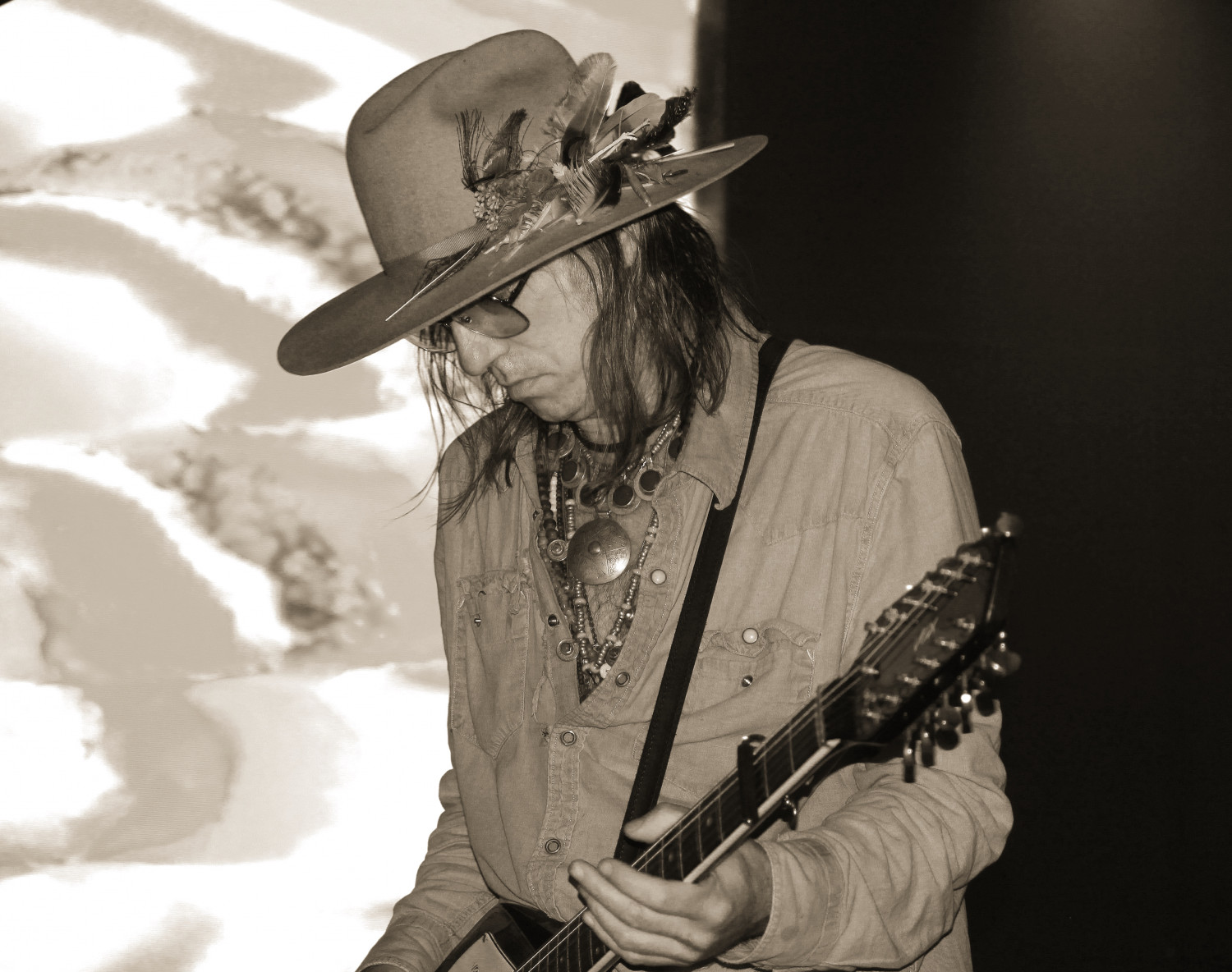
Anton Newcombe w/ The Brian Jonestown Massacre in Los Angeles | Photo Credit: Karan Singh
“He avoided mainstream success with a notorious combination of self-sabotage and sheer determination to do his own thing his own way,” the late Anthony Bourdain once said about Newcombe.
It’s not at all surprising, then, that the multi-multi-instrumentalist and singer is a total diva (don’t let the shaman getup fool you). After all, he was never handed anything besides an acoustic guitar. Now a missionary of untrammeled artistry, he possesses the “I’ll fight you” confidence of a veteran who has worked relentlessly to buy his freedom while pushing back against those who’ve secured a monopoly on his craft.
Three decades and 21 albums later, Anton still rubs a lot of people the wrong way because he truly believes in himself and the things that come out of his mouth. It’s practically impossible to tell such characters that they have it wrong, especially when they managed to outlive most of their competitors.
His flimsy vocals, twangy guitar tones and overall muddy sound might not work for everyone, but the product has remained unsullied through it all. Just like Sonic Youth and the Pixies, if you’re in the mood and decide to throw BJM on shuffle, your chances of being disappointed are very low.
You’ve remained consistent in exposing listeners to a wide range of sounds and influences from around the world. How do you go about collaborating with other artists when you enter a new space but don’t have enough experience?
AN: I’ll give you an example. I knew this film director who was working on a project about an Indian expat in Wales, and so he asked me to do the soundtrack. Now, I love Indian classical music, but guess what? It doesn’t exist in Western movies. I know so many fantastic South Asian musicians in the UK, so I told him I’ll talk to these people — Tabla Jedi and all — and get them together, help engineer the thing and make it comfortable for everybody to be productive. But there’s no fucking way, with all these people around, that I was going to do it because it’s insulting. This whole movie is about people from the other side of the planet, so you don’t need to put me in the mix.
When it comes to composing your own music, do you bring others in or play everything yourself?
AN: I have a bazillion instruments — sitars and tamburas and harmoniums and shehnais, just all kinds of things that I’m fascinated by. I play everything but the violin. It’s quite small in my hands, but it took me 11 minutes to teach myself how to play functional cello by just looking at it. The interesting thing is that the guy who invented the sitar didn’t take sitar lessons, which is something you have to remember about everything in life. The fucker who invented the flute didn’t take flute lessons — he invented it and just figured it out!
But an instrument like the sitar does have a strict academic discipline attached to it. How do you manage to make sense of the functionalities without adhering to the traditional grooming process?
AN: People forget that there’s also this village style of music that doesn’t even obey all that stuff. Like these are people just getting together to play, whether it’s drums or whatever, and they do follow patterns but a lot of it is still improvised. I was given acoustic guitars when I was six and no one taught me how to tune them, so I began playing melodies on one string since I was that young — it’s essentially the same thing.
It’s starkly evident from your work that you approach music like that, which in turn inspires people to go home and pick up an instrument — an informal process just makes the whole thing feel human.
AN: That’s stated clearly in the first 15 minutes of Dig! [2004 documentary about the Brian Jonestown Massacre and the Dandy Warhols] — “I’m going to start a revolution and show you how to do it.” I’m going to start a revolution because I want to end up on t-shirts in the merch section like Rage Against the Machine or Che Guevara.
The film turns 20 next year, so I have to ask you about it. It brought you a lot of attention but also tons of notoriety. Those who’ve stuck around since then have watched you evolve past being more than just a polarizing figure, but do you think it gave people the wrong impression of who you are? Does some of that footage haunt you in any way?
AN: Not at all. See, I actually took over those people’s film and told them they’re going to fucking fail. I had a better idea. They didn’t know who The Dandy Warhols were. They were opening for my band; they didn’t have a deal. So I told them about these guys I was playing with — that they’re going to go for it and do it all by the book, and I’m going to say “no” to everything. It’s two sides of the coin.
What’s your relationship like with the band and frontman Courtney Taylor-Taylor today?
AN: I talk to him all the time. The movie had people saying, “Oh, well Anton’s crazy and fucking violent and a genius, and the other guy’s just a full-of-himself asshole,” but Courtney has a lot of other productive qualities. He got screwed. He walked into a fucking trap by signing to a major label. All my peers and everybody in the music business get flushed down the toilet. Think of all the bands that’ve been around since I started, playing ridiculous characters — you might’ve heard their names, but they’re clinging onto “that landmark album from 1992.” It doesn’t fucking matter. I play in the same places as Dinosaur Jr. or fucking Thurston Moore or Bob Dylan.
Unlike those who succumbed to the business, is it fair to say that you’re in a comfortable and secure position after years of roughing it out?
AN: I made a lot of money when I was in my 20s because I worked non-stop, and that still helps me today. I left home as a teenager and started the band on Haight Street in San Francisco for $750 a month, in a three-bedroom apartment. That same place is now $13,900 a month, but the minimum wage won’t let you to live there anymore … unless you’re in the tech industry or some weird prostitution thing.
What do you think of the City in its current state?
AN: I don’t like it at all. When I moved to San Francisco around 1989–90, the population was 13.5% Black. Then this tech revolution just blows up, but only 3% of the industry is made up of Black people. That says it all right there. I don’t even want to live in this fucking country.
Is it true that you flipped a coin to decide between living in San Francisco and Berlin?
AN: Yeah, I did. Nobody bugs me in Berlin. I don’t need to be a part of the “music scene.” I only listen to what I want to listen to; I don’t get my ideas from other people. Like I don’t read Pitchfork — I think I blocked them on all my social media. Say I’m on YouTube and I find something I like, I start flipping through their channel. If I hear three good songs, I’ll look through every one of their uploads because it’s almost like finding a unicorn. I’m not saying that because someone likes Korn and Katy Perry, there’s something broken about them; I’m saying they do nothing for me and they never will.
Is there anyone in the mainstream circuit who appeals to you?
AN: Nobody. I started playing music when I was nine years old, so I’ve always tried to understand the business at the same time. To me, being famous was never the goal. I taught myself how to record by looking at pictures of sessions by the Beatles and the Rolling Stones, like the placements of the microphones and stuff. But there’s nobody big that … I mean there’s Kevin Shields and all, but we’re just different animals. See, I believe in creating conceptual art with live as the medium.
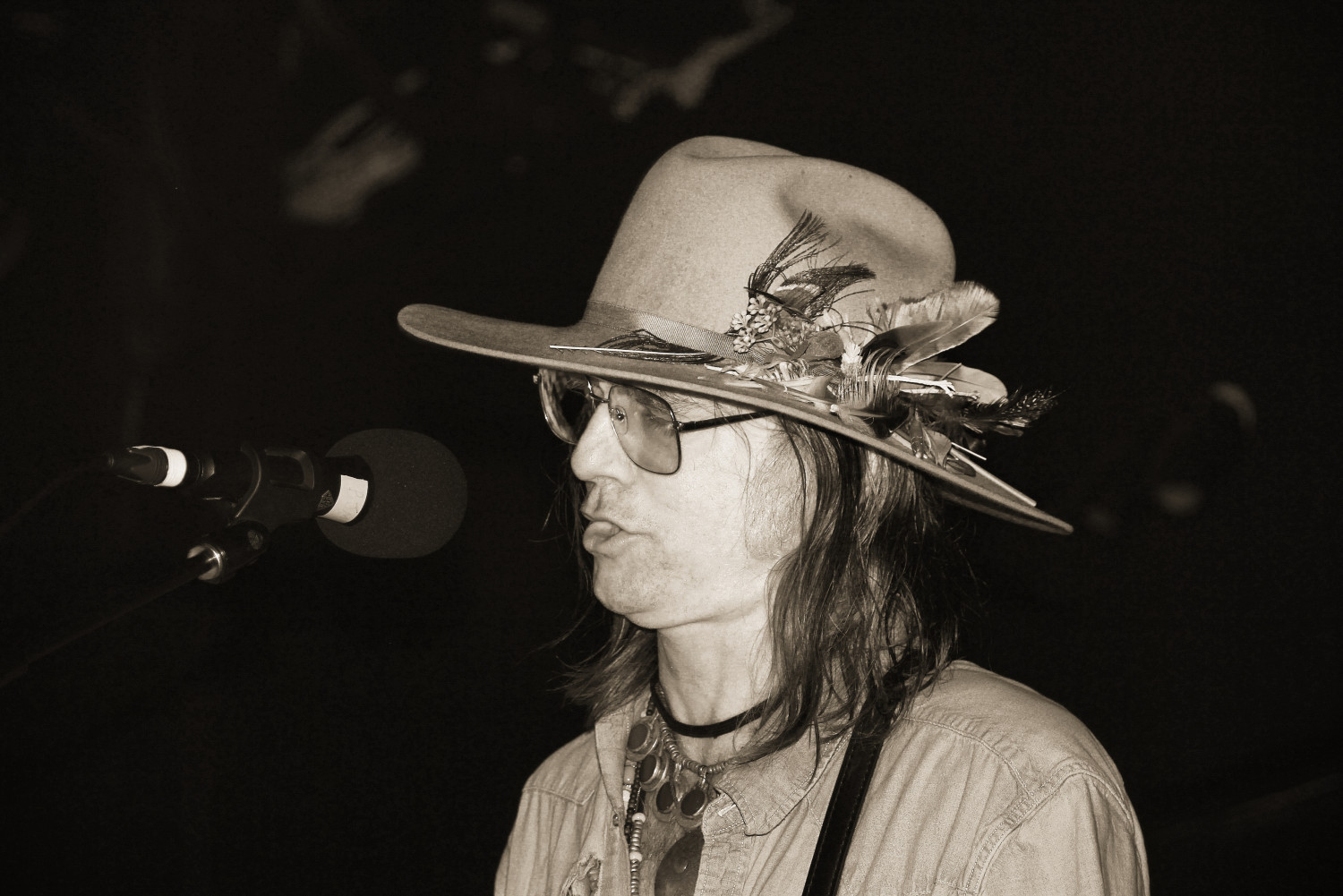
Anton Newcombe w/ The Brian Jonestown Massacre in Los Angeles | Photo Credit: Karan Singh
How do you feel about people calling your work “revivalist”?
AN: But it isn’t, because most of the pantheon of 60s bands don’t have that many good songs. They have a couple of great songs, but I’m way past them in record sales and everything you can imagine, but they’re the legends. I could do it all day long at 56, but if you look at where Paul McCartney was 20 years after Sgt. Pepper’s, he was doing “Ebony and Ivory” and “Say Say Say.” Look at the tail end of John Lennon’s career — it’s not stunning.
Then how would you explain an album title like Their Satanic Majesties’ Second Request?
AN: That’s something else … that isn’t trying to be retro! That’s a pastiche, like regurgitating culture in a blender. But you look at Artificial Intelligence (AI) — that’s data editing, not data entry. It is mid my definition because it can only be an accumulation of what already exists. It’s never the exceptional thing since it only picks the most exceptional examples. It essentially helps educate people who aren’t geniuses. The technology just fills in the rest, which is bullshit.
You’ve consistently followed through on an expectation you set. Do you ever contemplate throwing your fans a sharp curveball?
AN: I do it all the time, though. I flip my music on its ear all the time. I normally do multiple records at once because I have no desire to be LCD Soundsystem 2.0 if I end up doing a disco song. I have a general concept of hip-hop and country and every kind of music on the planet, and I’ll keep going through the process even if I have no intention of using it. One of my first instruments was the synthesizers, but when I was a teenager, everyone I knew was like, “Fuck, he’s a synthesizer f-ggot.” I’ve watched the whole evolution of this shit.
You operate manually for the most part — to what extent would you flirt with mechanization?
AN: My lady’s always like, “AI’s really interesting. You know you could use this to get ideas for lyrics or music or whatever,” and I’m like, fuck that. The best thing about art is when you put it down, look at it and think, “I don’t know.” Fighting the doubts and figuring out exactly what you want to do — that process is what leads to greatness. It’s like running through a house while it’s on fire but you manage to make it out the other side. Real art, and I’m not talking about it as a commodity, comes from a place where there’s no fear of failure. Look at people like Damien Hirst opening up catalogues, knocking off every single artist and doing it crazier. There are no original ideas and he’s not even touching anything; he’s got a crew doing it and that’s the joke. He’s got no fear of failure.
When you were approached by all these big labels, did you go into those meetings having decided beforehand that you won’t sign with them or was it something the executives said?
AN: Every single label approached me. It’s institutionalized buggery and they’re disgusting. The hip-hop industry in particular uses a power structure to break and rebuild artists, letting musicians think they’re the boss. So signees have their own imprints through which they sign other artists, allowing them to own other people’s shit. Look at how much P. Diddy and Jay-Z got — they’re billionaires now! They get no money from their deals, so it’s all the side gigs and the people who work for them who make the money.
When I went in, I told them to give me ten grand and buy me a studio, and that I would make them the most fucked-up records till the end of time in exchange. But they were telling me to focus and that I could be the next Kurt Cobain … but he’s dead. Come on, just buy me a fucking studio. I told them, “I’m going to keep releasing records and fucking put it in my will that they can never be sold. This next record I’m going to make is going to sound like you losing that money forever.”
Going back to your image at the time as depicted in Dig! — do you think they were bringing up names like Kurt Cobain because they saw you as a troubled creative who was destined to crash and burn?
AN: There was this illusion that, “Oh, here’s this junkie.” To be honest, I was done with drugs within two years, though booze and stuff is still a social lubricant for me. But more importantly, we used spy cameras to film the whole business — the entertainment business is the mafia, there’s no doubt about it. They were using cocaine and the highest-dollar call girls to lure me into having discussions about my band, but that’s nothing new with these business people. We filmed everything but they couldn’t even show it.
Do you still have access to that footage?
AN: We do, but the person who recorded it ended up selling the whole thing. I gave those people the opportunity to do the right thing. What happened was [director] Ondi Timoner was pregnant and ended up handing over the project to some other people, who were waiting for me to self-destruct. They didn’t have what she thought was a fucking story, so what they did was just assemble some shit together that wasn’t really factual. Then, you get into a space that has people asking, “What part of the Kardashian’s life is real and what isn’t.” When you have enough footage, you can create dramas and fake success.
I appreciate you sharing all this with me. Are there any questions that irk you?
AN: When someone asks me a question and I think it’s stupid, I don’t go all Bob Dylan and say, “How am I supposed to answer a question like that coming from a person like you?” I’ll just pretend like they asked me a question I want to answer and say whatever it is I’m thinking.

